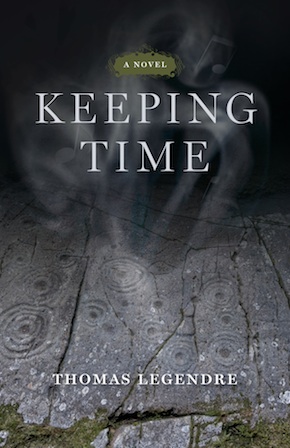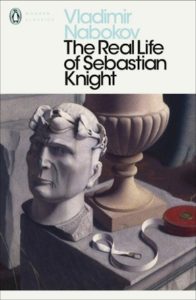How Boris Johnson ruined my book launch (and Vladimir Nabokov restored it)
by Thomas Legendre
“Intelligent and compelling… This complex exploration of time and the connections between worlds resonates beyond its reading.” Alison Moore
There’s a persistent aftertaste to bad timing. Just ask someone born on 11 September 2001, or the brides and grooms of late November 1963, after JFK’s visit to Dallas. Better yet, consider Vladimir Nabokov, whose novel The Real Life of Sebastian Knight – not nearly as famous as Lolita but arguably on par with it – was released less than two weeks after the attack on Pearl Harbor, as if he didn’t have reason enough to hate the Japanese Empire already. If you’re an author whose book has been released recently (spoiler: me) you can imagine the complicated grief Vladimir must have felt when he heard Roosevelt’s voice on the radio. The suffering and death of others is awful enough without fretting over something as trivial as your novel. But there it is anyway: Author’s Lament.
The slow-burning trauma of Covid-19 has offered no decisive event, no planes or bombs or gunshots, and nothing quite so momentous as Roosevelt’s voice on the radio. (Insert your favorite Trump meme here.) Like many people, I tried to dismiss the early reports coming from China. As an American living in Britain for nearly twenty years now, I was looking forward to modest fanfare and attention for the launch of my novel, set in Scotland and featuring two protagonists, one Scottish, the other a long-term American expat. Since my small, independent publisher has limited marketing power, this event, along with several others I had lined up, were crucial in letting bookshops and readers know about the novel’s existence. I felt a growing unease, however, as coronaviral clouds began to gather in the week before the release date of 16 March, even as I attended a friend’s launch, by happy coincidence scheduled only five nights before mine, with packed attendance at not only the event itself but also the pub afterward, where we all made sport of bumping elbows and knocking feet. Yet as my hangover faded, my misgivings grew. I emailed everyone on the invitation list, urging them to stay home if they had the slightest concern. It may be difficult to recognise now, but this actually seemed like erring on the side of caution.
After missing multiple briefings on the global pandemic and engaging in other derelictions of duty, Boris apparently came to his senses just as the bookshop in Edinburgh was unpacking copies of my novel and arranging chairs.”
As for Boris Johnson, I’m afraid I can’t offer the same defence. After missing multiple briefings on the global pandemic, spending his weekends at Chequers and engaging in other derelictions of duty, he apparently came to his senses just as the bookshop in Edinburgh was unpacking copies of my novel and arranging chairs. No doubt he did the right thing by telling everyone to avoid social gatherings and non-essential contact with others. Better late than never. Or too little, too late. Either way, his timing was off. This was especially obvious to me as he made the announcement about an hour before I was scheduled to step up to the podium.
No biggie. Things could be worse. Vladimir Nabokov, for example, had a rough time even before Pearl Harbor. Born to Russian aristocracy at the turn of the twentieth century, his father was decidedly reformist, though this was, again, an issue of poor timing – too little, too late. The Nabokovs fled the Revolution with their immediate possessions and caught a ship out of Sevastopol while Bolshevik machine guns strafed the harbour. Vladimir himself ended up settling in Berlin for fifteen years, taking some comfort in the Russian émigré community there, though Germany was a country he fundamentally disliked. Perhaps it was because his father was murdered while trying to foil the assassination of a political colleague, or perhaps it had to do with his Jewish wife Véra, who lost her job when the Nazis came to power. Vladimir tutored and gave tennis lessons to support her and their son, Dmitri, while writing for an audience that was effectively closed off to him by the Communist regime. And suffice it to say, things in Berlin were getting worse. He and Véra decamped for Paris not a moment too soon – out of the fire and into the frying pan, it turned out, as they bolted three weeks before the Panzer divisions rolled in. They eventually reached the United States with a grand total of one hundred dollars in Véra’s purse, most of which they almost paid to a taxi driver when they arrived, mistaking cents for dollars.
The Real Life of Sebastian Knight was written during that period in Paris, when Vladimir made the agonising decision to write in English for the simple reason that no one in Russia would be able to read his work even if they knew it existed. It was a practical choice, inspired by groceries and rent. More immediately, he had his eye on the prize money for a literary contest in Britain. Working conditions weren’t ideal. Living in a studio apartment with Véra and young Dmitri, he retreated to the bathroom every day to write, laying a suitcase across the bidet to use as a desk. It was winter. When the sun went down his fingers would go numb from the cold. Meanwhile his mother was living in Czechoslovakia, which by then was under Hitler’s iron thumb, and he suspected (correctly) that he would never see her again.
The Real Life of Sebastian Knight is a movingly subtle and eerie work, especially now… The narrative never dips into nostalgia, yet evokes feelings of a world lost forever.”
 The Real Life of Sebastian Knight didn’t win the contest – and in fact no publisher wanted it afterward. Nabokov lugged it across the Atlantic and all over the continental US for three years, taking odd teaching jobs and other employment wherever he could find it. His fortune finally seemed to change, though, when a young upstart names James Loughlin, heading an imprint called New Directions, took Edmund Wilson’s advice and made Vladimir an offer he couldn’t refuse – that is, any offer at all. But of course Japan had its own agenda, and so the Axis Powers added insult to injury. For someone who started life in such high privilege – or, as he put it, “a perfectly normal trilingual child in a family with a large library” – the guy couldn’t catch a break.
The Real Life of Sebastian Knight didn’t win the contest – and in fact no publisher wanted it afterward. Nabokov lugged it across the Atlantic and all over the continental US for three years, taking odd teaching jobs and other employment wherever he could find it. His fortune finally seemed to change, though, when a young upstart names James Loughlin, heading an imprint called New Directions, took Edmund Wilson’s advice and made Vladimir an offer he couldn’t refuse – that is, any offer at all. But of course Japan had its own agenda, and so the Axis Powers added insult to injury. For someone who started life in such high privilege – or, as he put it, “a perfectly normal trilingual child in a family with a large library” – the guy couldn’t catch a break.
Over the years he made incremental progress in his literary efforts, publishing short stories and earning a reputation as an erudite lecturer. But strangely enough he didn’t find true success until Lolita, a novel so risky that American editors either loathed or didn’t dare release it in the US. The only one willing to take it on was Maurice Girodias of Olympia Press (located in Paris, of all places) a publisher in the mould of P.T. Barnum whose preferred marketing strategy was scandal. Nevertheless, Lolita received little serious attention until Graham Greene happened to choose it as one of the three best books of the year in the Christmas issue of The Sunday Times. This was what you’d call a signal boost or, from Nabokov’s perspective, the opposite of Pearl Harbor. The ensuing controversy was just what Girodias wanted and Nabokov ultimately needed. In the glow of Lolita’s sales figures, his previous work began to receive some overdue attention.
Which brings us back to The Real Life of Sebastian Knight. It’s a movingly subtle and eerie work, especially now, with a narrator named V. seeking some kind of secret truth or knowledge about his long-lost half-brother, the Sebastian of the title, who has recently died. His quest to renew contact with Sebastian is inseparable from the pre-Revolution Russia of their childhood. The narrative never dips into nostalgia, yet evokes feelings of a world lost forever, a longing to reach someone who can no longer be touched, instead known only from a distance. I could go into greater detail, but if you’ve read it, then you know I’ve already said too much. And if you haven’t read it yet, lucky you. Good times ahead.
Pearl Harbor has hardly been forgotten, but it has been assimilated into history, while The Real Life of Sebastian Knight quivers in readers’ minds. This is a long-term view that Nabokov couldn’t have possibly known in December of 1941, but it offers some solace as Covid-19 continues to burn and Boris Johnson does the right thing at the wrong time and vice versa. I’ll forgive him, eventually. In the meantime, he could make it up to me by plugging my novel. After all, one of its protagonists is an archaeologist who escapes a seemingly miserable present by travelling back in time to a better point in his life, only to discover his solution may lie in the future. Now more than ever, maybe some of us can understand how he feels.
 Thomas Legendre is Assistant Professor in Creative Writing at the University of Nottingham. He is the author of the novel The Burning, as well as Half Life, a play performed with the National Theatre of Scotland, and the radio drama Dream Repair, aired by BBC Radio 4. Keeping Time is published in paperback and eBook by Acre Books, University of Cincinnati.
Thomas Legendre is Assistant Professor in Creative Writing at the University of Nottingham. He is the author of the novel The Burning, as well as Half Life, a play performed with the National Theatre of Scotland, and the radio drama Dream Repair, aired by BBC Radio 4. Keeping Time is published in paperback and eBook by Acre Books, University of Cincinnati.
Read more
thomaslegendre.com
@legendreality
Author portrait © Connie McGovern


